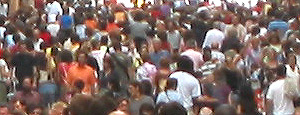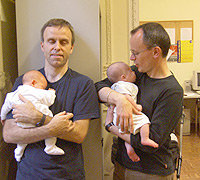
In this unit you will review the following points:
- Expressing opinions
- Hedging
- Qualifying using adjectives and adverbs
- Linkers
- Useful vocabulary: Society

1. Text organisation.
Read the Task 2 question and then number the paragraphs of the sample answer in the correct order.
Writing Task 2
You should spend about 40 minutes on this task.
Write about the following topic:
Many people believe that women make better parents than men and that this is why they have the greater role in raising children in most societies.
To what extent do you agree or disagree with this statement?
Give reasons for your answer and include any relevant examples from your own knowledge or experience.
Write at least 250 words.
2. Expressing opinions.
Choose a phrase with a similar meaning to the highlighted phrases.
Passives
2. Research carried out in Gambia showed that the presence of a grandmother improved survival rates.
3. This allows them to develop their parenting skills, which were previously thought to be the domain of the woman.
There is/are
4. There is evidence to suggest that women are more important in the survival of a baby.
It + is/seems/looks/sounds, etc.
5. It is also argued that in many ways it seems logical that mothers should take care of children.
6. It is still difficult to say, however, whether there is a fundamental difference between the parenting of men and women.
Avoiding phrases such as I think…
7. This, however, may say more about this culture in particular than about men in general.
8. But in today's society these roles are no longer important.
3. Expressing opinions.
Put the words in order to make a sentence with a similar meaning to the one given.
4. Hedging.
TIP:
When making a claim a writer can say, for example:
1. X is true. or
2. X is often true. or
3. X seems to be true.
Example 1 can be dangerous for the writer, as another person might say, "But that's wrong because here's an example where X is not true."
Examples 2 and 3 are safer, because they allow the writer to make claims even when they are not 100% certain. This is especially important in scientific writing, and is sometimes called hedging.
Choose the sentence which is "safer".
9. Linkers.
Are the pairs of sentences almost exactly the same, different in emphasis or quite different?
11. Practice question.
Read the instructions and write your answer. Remember to:
- use a variety of ways of expressing opinions.
- use hedging to make your claims less strong.
- use adverbs and adjectives to specify clearly what you are talking about.
- use a variety of linkers appropriately.
Writing Task 2
You should spend about 40 minutes on this task.
Write about the following topic:
It is generally agreed that society benefits from the work of its members. Compare the contributions to society of artists with those of scientists.
Which type of contribution do you think is valued more by your society? Give reasons for your answer.
Give reasons for your answer and include any relevant examples from your own knowledge or experience.
Write at least 250 words.
When you have completed the writing task, you can look at a sample answer. Compare the sample answer with your own.
It is hard to imagine a world without either scientists or artists. The former change our world with their discoveries and knowledge, while the latter change the way we look at things and encourage us to be more in contact with our feelings and imaginations.
Scientists are highly valued for their contribution to advancements in medicine and technology. They make us live longer, provide us with information, and enable us to be more productive, travel faster and earn more. Where would we be without them? Western society values scientists highly, as the very culture is based on science and technology.
Artists, too, are generally admired, but perhaps not thought of as essential to society. Indeed, many people would argue that art is not really necessary for the survival and development of the human race. This, however, may not be entirely true. After all, imagine a world without paintings, music and dance. These are the things in our world that make us happy and help us to develop relationships with other members of our species. True, we may not need them to survive, but what use is living if we can't enjoy it?
So perhaps scientists and artists should be valued equally for their very different contributions to our culture. However, when all is said and done, in today's society people are generally valued for the usefulness of what they produce, rather than the quality of their work, so the Western scientist is generally valued more highly than an artist in the same culture. It may well be a different story in other parts of the world.